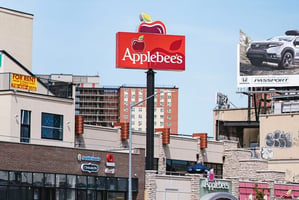Who should you put in the media spotlight when a crisis happens?
A crisis can take many shapes and forms.
Each has the potential to generate social media storms, round the clock TV coverage and put brand reputations at risk.
The key to emerging from a crisis unscathed is training and preparation. Organisations need to know how to respond and what to say before their worst nightmares happen.
This is why the next four Masterclasses for The Media Team Academy will focus on crisis communication.
Sean Ryan, a former Sunday Times journalist, will guide delegates through preparing for a crisis, identifying and minimising reputation hits, managing incidents that threaten lives, and rebuilding trust.
The series starts on April 26 with Sean’s guide to crisis preparation.
He said: “One of the things we’ll be looking at in our first session is what every comms professional can do to prepare for different types of crisis.
“It makes a massive difference if you’ve planned what to say, especially in the first hour.
“Some of the organisations that are damaged most by a crisis are caught off guard by the initial reaction in the media and never recover.
“The ones who come out with their reputation intact have usually thought this through before disaster strikes. They know in advance how they’re going to respond to everything from fraud to product flaws, fatalities to sexual misconduct.”
As part of this The Media Team Academy masterclass, Sean will explore 14 types of crises your organisation could face.
And we thought we would share them in this crisis communication training blog.
Accidents
Accidents are the most obvious cause of a crisis.
Think of things like factory accidents, fires and gas leaks.
Those that involve fatalities gain far more media interest. Think about who could be affected – customers, suppliers, staff (and families) and the local community all need considering.
One of the most infamous examples – particularly in terms of how the crisis was handled – was the Deepwater Horizon disaster.
The explosion on the oil rig killed 11 people. And 134 million gallons of oil spewed into the Gulf, fouling beaches and killing hundreds of thousands of marine animals.
BP struggled to grasp the scale of the disaster. And seemed poorly prepared for the media scrutiny.
Several days into the crisis, CEO Tony Hayward memorably said: “There’s no one who wants this thing over more than I do. You know, I’d like my life back.”
Product flaws
Defective products are a huge reputational risk, particularly when there is a threat to consumer safety.
Toyota is a good example of this. It recalled 3.8 million vehicles in November 2009 because of floor mats that trapped accelerator pedals. It was followed by an additional 400,000-vehicle recall four weeks later, and many more recalls the following year.
For a company with a reputation based on superior quality and safety, this was hugely damaging.
Other examples include Samsung recalling its Galaxy Note 7 phone after reports the model burst into flames.
And just last month, Fitbit recalled 1.7m Ionic smartwatches because of ‘burn hazard’, following reports the battery overheated.
Working conditions
There is growing scrutiny of how businesses treat those that work for them and workplace culture.
The pandemic - and how it changed work - has accelerated a focus on how organisations and senior leaders treat their employees.
And in the digital age, that scrutiny is often fast and furious.
Amazon is a prime example of a company that has seen working practices covered by the media.
But while it may be the biggest name, it is far from alone.
JD Sports has twice seen its working conditions covered by the media. In 2016, footage from its warehouse, showing staff complaining conditions were “worse than prison”, was broadcast on Channel 4 News.
The report said staff faced a “three strikes and you’re sacked” policy, where sanctions could be given for things like chewing gum.
Further concerns were raised in 2019 when it was revealed the same warehouse in Rochdale, and an ASOS warehouse in Barnsley, each received almost one emergency medical visit per week over a year.
The Unite union responded to the story by saying: “The warehouses of some companies risk becoming the dark satanic mills of the 21st century.”
Harmful stories about working conditions do not just centre on those companies with vast warehouses.
Goldman Sachs faced damaging allegations last year after an internal staff survey was leaked online. Employees raised concerns about “inhumane” working conditions and claimed to work around 100 hours a week on average.
The findings came from a relatively small group of 13 first-year analysts. But it identified significant issues and received extensive media coverage.
Staff crisis
More and more crises centre on the actions of employees.
Typically, this is driven by what they post on social media. And sometimes by how they behave in the workplace.
Fashion brand Ted Baker found itself at the centre of damaging headlines in 2019 after founder Ray Kelvin faced allegations of forced hugs and harassment.
He initially took a “voluntary leave of absence” and eventually resigned.
Estate agent Savills spent time in the spotlight last year, trending on Twitter and featuring in uncomfortable headlines, after a Tweet containing racist language emerged that appeared to have been sent from the account of one of its employees.
Senior leaders
There is an often-used expression in football about under pressure managers having “lost the dressing room.”
And the saying relates to other organisations.
People need to feel that they are well-led. When they don’t, cracks and leaks begin to emerge. And the situation can quickly escalate.
Let’s take Gavin Williamson as an example. His tenure as Education Secretary was marked by a series of blunders.
It included the A-level algorithm fiasco, failing to provide laptops to children who needed them during lockdowns, and the free school meals PR disaster (which also involved him mistaking Marcus Rashford for Maro Itoje).
Unsurprisingly, any confidence headteachers and teaching unions had in him eroded. And he was sacked last year.
How senior leaders behave can also pose risks to reputations.
KPMG’s UK boss Bill Michael stepped down last year following a backlash over comments he made during a staff Zoom meeting.
He told consultants to "stop moaning" about the impact of the pandemic and lockdown on people's lives, and to stop "playing the victim card".
He also said that the concept of unconscious bias was “total crap”.
And the boss of digital mortgage company Better.com made headlines across the world at Christmas after sacking 900 people in a brutal three-minute Zoom call.
In a video shared widely online, Vishal Garg said: “I come to you with not great news. If you’re on this call, you are part of the unlucky group that is being laid off. Your employment here is terminated effective immediately.”
Financial performance
The pandemic wreaked havoc on the global economy.
Many businesses have struggled and need to make changes to how they run.
CVS Health, one of the largest pharmacy chains in the US, recently announced the closure of 900 stores to make "health care more affordable, accessible and convenient for consumers".
More recently, P&O Ferries sunk its reputation after sacking 800 employees through a pre-recorded video message. The company said the changes were necessary because it was losing £100 million year-on-year.
Another recent financial story centred on Unilever frustrating its investors by placing too much focus on sustainability.
The other issue brands face is that money is on everyone’s mind. Purse strings have been tightened, and prices are going up.
This results in questions about how customers can afford their goods and services, particularly when they are essential items, such as power, fuel and food.
And we are never too far away from a ‘fat cat’ pay exposure.
Tax affairs
This is a form of crisis media management incident with fairness at its heart.
People want to know and feel that big business pays its fair share and is contributing to society.
Those who don’t, or who are perceived not to, strike a raw nerve with the public.
Google, Amazon, Starbucks and Facebook are just some of the massive names that have had their reputations damaged by allegations of tax avoidance.
Some have faced calls for a consumer boycott.
Public interest in corporate taxation tends to rise during times of economic challenge. As we enter a cost-of-living crisis, expect the scrutiny to rise again.
Taxation can be complex. And this issue can be greatly simplified in the media and the court of public opinion.
Those brands that are not comfortable discussing their tax policy – or can’t explain it simply – could be particularly vulnerable.
Fraud / corruption allegations
There is a long list of companies that have seen their reputations damaged by accounting scandals.
Some collapse altogether. Wirecard, a German fintech business, was valued at 42 billion dollars in August 2018.
Less than two years later, it had applied for insolvency after admitting it had a £1.7billion black hole in its accounts. The collapse caused widespread embarrassment in Germany, with politicians and experts criticising authorities and watchdogs for not acting quicker.
In the UK, you may recall Tesco was at the centre of a fraud crisis in 2014. The scandal centred on allegations profits had been overstated by £250m - a figure later increased to £326m.
The accusation wiped £2bn from its value and led to the arrest of three senior executives, although the cases were later thrown out of court.
The Financial Reporting Council finally closed its five-year investigation into the scandal in 2020, showing that some crises can linger.
No sporting tournament is bigger than the World Cup, and few corruption scandals are as huge as the FIFA one which erupted in 2015 – a case study Sean will look at in more detail during The Media Team Academy masterclass.
Supply chain
Companies are reliant on their supply chains.
And how those in the supply chain behave poses a risk to reputation.
Take Boohoo as an example.
The fast-fashion brand became the face of worker exploitation when allegations emerged about a factory in its supply chain.
An undercover investigation by The Sunday Times reported workers at a factory in Leicester that supplies the brand paid workers as little as £3.50 an hour. It was also reported the factory continued working during local covid lockdown restrictions.
Amazon, ASOS, Next and Zalando pulled the brand's products following the story. Boohoo claimed the factory was not a direct supplier and promised a review of its supply chain.
Your supply chain could, however, also trigger a crisis by being unable to supply. The Ever Given getting stuck in the Suez Canal demonstrated the fragility of some supply chains.
The most infamous example of supply chain issues came when KFC ran out of chicken after changing its ‘delivery partner’. The crisis was, however, handled brilliantly.
Cover-up exposed
A cover-up is never a good crisis media management strategy.
The truth is normally found. And if there is any suggestion an organisation has tried to cover it up, the reputational damage will be magnified.
One of the most significant crises I have written about in these crisis communication training blogs is the Oxfam Scandal.
The Times revealed, in 2018, that senior officials at the charity had been exploiting sex workers in Haiti, after the 2010 earthquake. This included using sex workers who may have been underage.
And the charity was accused of covering up the scandal.
An internal Oxfam investigation in 2011 had led to four people being sacked and three others resigning. But a report published by the charity after the investigation failed to mention sexual exploitation.
A year later, the Charity Commission found there was a "culture of poor behaviour" at Oxfam and issued it with an official warning over its "mismanagement".
Data breach / online service collapsing
We live in a digital age, and many organisations are increasingly reliant on digital communication and services.
But, at the same time, there is an increasing risk to data security and online services.
Companies like Marriott Hotels, Capital One and British Airways are just some of the big-name brands that have suffered data breaches over the past few years.
Data breaches, whether caused by criminals or human error, are increasingly common and are constantly in the news. And organisations of all sizes are finding they are the victim.
According to Gov.uk, around four in ten businesses (39 per cent) and just over a quarter of charities (26 per cent) have reported having cyber security breaches or attacks in the last 12 months.
Despite the risks, many brands are slow to respond.
Online services going down is another reputational risk, particularly as more people have become dependent on them over the past few years.
A crisis we often refer to during our crisis communication training is the TSB IT fiasco. It was caused by an attempt to move to a new IT system. That left thousands of customers unable to access their accounts, while others reported they could access other people’s details.
At one point, the Daily Mail suggested TSB stood for Totally Shambolic Bank.
And the IT issues went on sporadically for months. Not only was the failure hugely costly, it also saw Paul Pester forced to stand down as chief executive.
Natural
When we think of a natural crisis, we typically think of disasters caused by earthquakes, hurricanes, tornadoes and other forms of severe weather.
Flooding has become a growing problem in the UK in recent years, with climate change making extreme rainfall more common. Additionally, the country has recently been battered by successive storms.
The impact of natural disasters can be severe. What plans does your organisation have for a crucial plant being flooded or damaged by falling trees?
Should you send your teams home when there are severe weather warnings in place? Amazon made headlines in the US after its drivers were told to keep working despite tornado warning sirens going off.
Natural disasters are not restricted to devastating weather. Viruses, as we have become all too aware over the past couple of years, can be hugely damaging.
Covid changed the way we worked, closed businesses for months and forced organisations to rethink how they could keep employees and customers safe.
Social media/marketing
Brands don’t always get it right with their promotional activity.
And when it goes wrong, it can result in a big reputational hit.
OVO Energy provide a recent example.
It found itself at the centre of a social media storm and featured in negative headlines after issuing ‘keep warm’ advice to customers feeling the impact of rising energy prices.
The tips included cuddling pets and doing star jumps.
CEO Stephen Fitzpatrick described the advice as “really embarrassing.”
He added: “It was a stupid thing for us to have written. It is something I regret. I am very sorry that we sent it. It is a big company and somebody had a bad day.
“We deserve to be getting a lot of trouble from this.”
Political
Russia’s invasion of Ukraine has dominated the recent news agenda.
And it has put companies with activities in Russia under scrutiny. Apple, Nike, Ikea, Mastercard and American Express are among those who have paused or cancelled their services or operations in the country.
Shell initially defended its decision to buy Russian crude oil after Ukrainian Foreign Minister Dmytro Kuleba hit out at the energy company, asking on social media: "Doesn't Russian oil smell (like) Ukrainian blood for you?" It subsequently apologised and pledged to stop buying oil from Russia.
And McDonald’s and Coca-Cola faced boycott calls until they joined the list of firms halting business in Russia this week.
Russia links have also caused problems for Chancellor Rishi Sunak with questions asked about his wife’s involvement in a company called Infosys, which operates in Russia and has an office in Moscow.
All brands need to know how to manage a crisis. Crisis communications training and crisis management training allow you to do this without the fear mistakes will have devastating consequences.
Find out more about our crisis communication training and crisis management training. Crisis communication is also covered through the masterclasses on our year-long learning a development programme. Find out more about what The Media Team Academy covers.
Media First are media and communications training specialists with over 35 years of experience. We have a team of trainers, each with decades of experience working as journalists, presenters, communications coaches and media trainers.
Click here to find out more about our crisis communication training courses.
Subscribe here to be among the first to receive our blogs.




